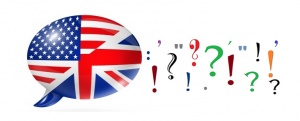Difference between revisions of "Language/English/Grammar/Punctuation"
AussieInBg (talk | contribs) |
|||
| Line 4: | Line 4: | ||
I'll use these when referring to examples such as "For example," take note that I say that later in the lesson. | I'll use these when referring to examples such as "For example," take note that I say that later in the lesson. | ||
== Formal | == Formal punctuation marks == | ||
The following | The following punctuation marks can be used at the end of any sentence. | ||
===The question mark ?=== | ===The question mark ?=== | ||
? - The question mark | ? - The question mark. This is used at the end of a sentence that asks a question. | ||
For example, "How are you?", "What are you doing today?", and "What are you wearing?" | For example, "How are you?", "What are you doing today?", and "What are you wearing?" | ||
===The exclamation mark=== | ===The exclamation mark !=== | ||
! - The exclamation mark, this is used to show someone being loud, or very excited. | ! - The exclamation mark, this is used to show someone being loud, or very excited. | ||
For example, "Oh my gosh!" and "I can't believe it!" | For example, "Oh my gosh!" and "I can't believe it!" | ||
===The period .=== | ===The period or full stop .=== | ||
. - The period, | . - The period (American English) or full stop (British English) , is used at the end of a sentence. It will always be used at the end of a sentence unless replaced by one of the punctuations shown above. | ||
For example, "Hey." | For example, "Hey." and "This is an example sentence using a full stop." | ||
===The comma ,=== | ===The comma ,=== | ||
, - The comma is used when pausing in a sentence or when making a list of three items or more. | , - The comma is used when pausing in a sentence or when making a list of three items or more. | ||
| Line 29: | Line 29: | ||
===The apostrophe '=== | ===The apostrophe '=== | ||
' - The apostrophe | ' - The apostrophe is used in abbreviations/contractions or to show possession of something. | ||
For example, "don't", "won't", "Lilly's book.", "Daniel's wallet." | For example, "don't", "won't", "Lilly's book.", "Daniel's wallet." | ||
| Line 46: | Line 46: | ||
Please edit this part | Please edit this part | ||
== Informal | == Informal punctuation marks == | ||
These sort of punctuation are only used online and very sparingly at that. | These sort of punctuation are only used online and very sparingly at that. | ||
===Show action <nowiki>**</nowiki>=== | ===Show action <nowiki>**</nowiki>=== | ||
Revision as of 00:18, 26 August 2020
In English grammar, there are many ways to punctuate sentences. I will try to go over all of them today. I will organize them based on what is used formally and what isn't. Before that, I'll tell you what " " those marks mean, as I will use them throughout the lesson frequently. " is used to quote what someone is, will, or has said.
I'll use these when referring to examples such as "For example," take note that I say that later in the lesson.
Formal punctuation marks
The following punctuation marks can be used at the end of any sentence.
The question mark ?
? - The question mark. This is used at the end of a sentence that asks a question.
For example, "How are you?", "What are you doing today?", and "What are you wearing?"
The exclamation mark !
! - The exclamation mark, this is used to show someone being loud, or very excited.
For example, "Oh my gosh!" and "I can't believe it!"
The period or full stop .
. - The period (American English) or full stop (British English) , is used at the end of a sentence. It will always be used at the end of a sentence unless replaced by one of the punctuations shown above.
For example, "Hey." and "This is an example sentence using a full stop."
The comma ,
, - The comma is used when pausing in a sentence or when making a list of three items or more.
For example, "I need to buy eggs, bread, and cake.", "I like dogs, cats, and rabbits.", and "hmm, alright."
The apostrophe '
' - The apostrophe is used in abbreviations/contractions or to show possession of something.
For example, "don't", "won't", "Lilly's book.", "Daniel's wallet."
the semi-colon ;
Please edit this part
the colon :
Please edit this part
the quotation marks “ ”
Please edit this part
the hyphen -
Please edit this part
brackets ( ) or [ ]
Please edit this part
the slash /
Please edit this part
Informal punctuation marks
These sort of punctuation are only used online and very sparingly at that.
Show action **
** - To show action, if you want to show someone what you're doing or act something out you will place it inside two * symbols.
For example, *waves*, *closes tab*, *jumps*
